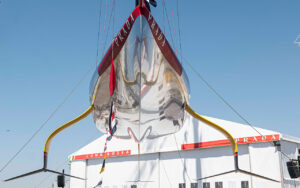Despite what some of my friends (and parents, and professors) seem to believe, I only spend a fraction of my time traveling for sailing. Most of the time I’m here in Boston, doing regular 22-year-old things: going to school, and going to work. I’d imagine that most SW readers are familiar with the undergraduate experience. Something I’ve been reflecting on a lot this year, that you may be less aware of, is the relationship between my job and the racing I do.
I work behind the bar and with the kitchen at a small restaurant called Bergamot, just outside Harvard Square. The general manager and chef own the place, the food is sourced locally and responsibly, and Boston Magazine gave us an award for the best wine program in the city in 2011—in short, I’ve been working there for almost a year, and I’m pretty smitten with the place. Spending time there has seriously enlightened my understanding of the life of a professional cook. If you imagine that cooks at progressive restaurants are like bohemian creatives, flourishing frying pans like paintbrushes and dreaming up new dishes poetically, I’ve got news for you. Those men and women are far closer to soliders than artists, fully immersed in a constant struggle to maintain quality output. Good kitchens, no matter how exotic the cuisine, are much more defined by the less sexy prep activities (making stocks, blanching vegetables, peeling favas, and dicing mirpaux) than by emulsifying foams and creatively dotting plates with gastriques. Great food is born from a clean, well-prepped and organized kitchen: not an abstract savant dreaming over a pan. That is a generally accepted law in the world of high-level professional cooking, famously stated by a prominent New York chef: “Cook clean or you’re f****ed.” So what does all this have to do with sailing?
I’ve spent the last year working with and learning from serious professional sailors on the road, and serious professional cooks at home. My conclusion from this unique body of research is that, at their essence, both jobs are the same. Or, more specifically, success is achieved in the same fashion. Working clean: being organized and properly prepared. It’s not sexy, but it’s true.
They say you can’t win a regatta on the first day. I’d argue no one has ever won a regatta on the last day either. Regattas are won the day before an event, and the week before, and the months before. They are won in tireless boathandling drills that allow your team to relax and execute in that final race. They are won when you get to the boat early to do an area check. They are won that Sunday afternoon in the off season when you decide to clean out and re-organize the toolbox, so when you have that totally unexpected and completely unpredictable breakdown you can get back on the race course as fast as possible. They are won when you tape your shrouds each and every time, and your competitor decides to skip it just this once, and shreds their spinnaker on the final run. They are won when, despite an exhausting day on the water, you make sure your bowman goes up the mast after every day of heavy air sailing to do a rig check. They are won when you zip tie shackles. They are won when you make sure you hydrate. They are won when you flake sails well. They are won in prep.
Just like in cooking, the second you cut a corner, it is glaringly obvious. Didn’t bring the right gear? You’re not going to win a regatta when you’re freezing and soaked. Didn’t take the extra time to flake that spinnaker after last regatta? Pretty obvious when it goes up in a ball your first practice set and you rip it. Didn’t slice enough carrots in prep this morning? Pretty obvious at 9 p.m. when all your teammates’ dishes are getting cold in the window and you can’t put up that chicken dish because you are out of carrots. Maybe you can get away with being talented and lucky at the lower level, but, when you get to the championship, it’s about preparation and high percentage moves. Work clean, or you’re f****ed.
Next time you see a skipper slide across the finish line just inches ahead for the win, think about what he or she was doing the week before the event. Think about how much time they spent polishing their boat. If it’s a professional program, think about the long, hard hours underappreciated shore crew spent making sure the equipment was race-ready. Think about the one team member who always has a roll of tape or a sail tie in their pocket and saved a race from disaster.
There will always be inexplicable shifts, unpreventable breakdowns, and other seemingly mystical factors that we can’t prepare for. That’s what keeps us all coming back to the sport, no matter how bitter we are after some defeats. But the championship programs are the ones that minimize mistakes. They know that glory is really found in good prep, and working clean. It might not seem obvious, but ask anyone who has spent enough time in this sport and they’ll agree that putting that wrench away in the wrong place is the first step to losing a regatta. Sorry to spoil your fantasies, but I’ve been to the other side, and I’ve seen it firsthand, in victory and defeat. The America’s Cup has never been won on TV. It was won in the workshop container months before that.
If you want to be at the front of the fleet with consistency, it starts and ends with good preparation. The rest, the on-the-water bit, follows easily. (As my coach Ken Legler always says, “Start in first and sail faster than everyone else.”) But if you’re not organized, if you’re not thorough, even the most talented teams will blow their regatta on something small. And then another team will do the same. And another, and another. At the end of the last race, it’s the best prepped guy that will be standing on the podium, smiling, and thinking about when the awards ceremony will end so he or she can go back to putting the boat away and organizing the sails for the next event. Because even though the championship just ended, they’re already racing the next event. Work clean, or you’re f****ed.
This post is dedicated to my father, who has been trying to teach me this lesson since I was born, despite my stubborn resistance for the first 20 years of life.









